South Africa is increasingly becoming an unsafe country for women


On August 9, 1956, 20,000 women protested the discriminatory “pass laws” of the apartheid state by marching to Pretoria, South Africa’s capital city, where the Union Buildings housed the government.
Without a “pass,” which functioned like an internal passport, black people were unable to move, not even on daily commutes to and from work. It served as a means of regulating and upholding segregation and the movement of people into cities. If you didn’t have the document with you, you risked being detained and getting a criminal record.
After the return of democracy in South Africa in 1994, August 9 was proclaimed as Women’s Day, a national holiday honoring that protest march, and August was named Women’s Month to recognize the contributions of women.
However, women in South Africa now face a new enemy in the form of gender-based violence, albeit, after 28 years.
Police Minister Bheki Cele has conceded that South Africa is a “very dangerous” country. Rape is reportedly widespread and institutional in South Africa, according to those who work to protect women. As per police figures, there are approximately 115 rapes every day in South Africa, which is among the highest rates worldwide.
On August 29, 2019, Uyinene Mrwetyana, a South African student studying in Cape Town, was brutally raped and killed while visiting the post office in Claremont, a suburb of Cape Town, to pick up a package. Oscar Pistorius, a paralympic athlete, was sentenced to prison in 2015 after killing his girlfriend, Reeva Steenkamp, in a fit of rage.
Eight women were repeatedly raped by illegal miners on July 28 in Krugersdorp, a town west of Johannesburg this year.
Police Minister Cele said on national television in the days following the gang rape that one of the victims was “lucky” since she had only been raped once.
During the COVID-19 lockdown, different organisations in the country highlighted concerns about the rise in gender-based violence, and South African President Cyril Ramaphosa frequently referred to it as a “second pandemic.”
According to some observers, the current violence against women stems from the history of apartheid, when the government murdered thousands of people and established a social norm for violence. Responding violently to state violence was one way to express one’s protest. The levels of violence in South African society today are a result of the country’s tragic past, poverty, and high unemployment rates.
Thandiwe McCloy, the spokesperson for People Opposing Women Abuse (Powa), said that in the period from April to June, 855 women had been murdered, while more than 11,000 had been charged with assault with the intent to do grievous bodily harm. She claimed that the data showed the dangerously high rates of violence against women and the necessity for NGOs, faith-based groups, the government, and businesses to make every effort to address gender-based violence.
High rates of alcohol misuse in communities across the nation fueled attacks on women and children, even while patriarchy and gender inequity were the primary drivers of gender-based violence.
The statistics show that 1,546 rape incidents occurred in public areas including streets, open fields, leisure centers, parks, beaches, parking lots, and abandoned buildings, compared to 3,780 rape incidents that occurred at the home of the accused offender or victim.
